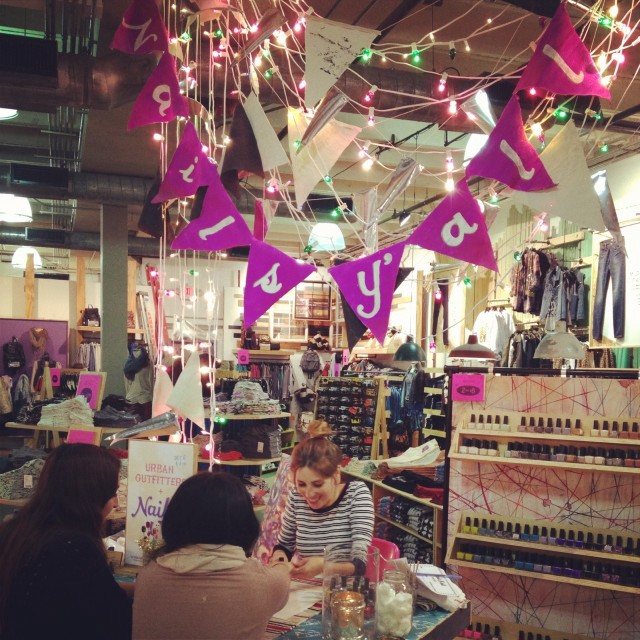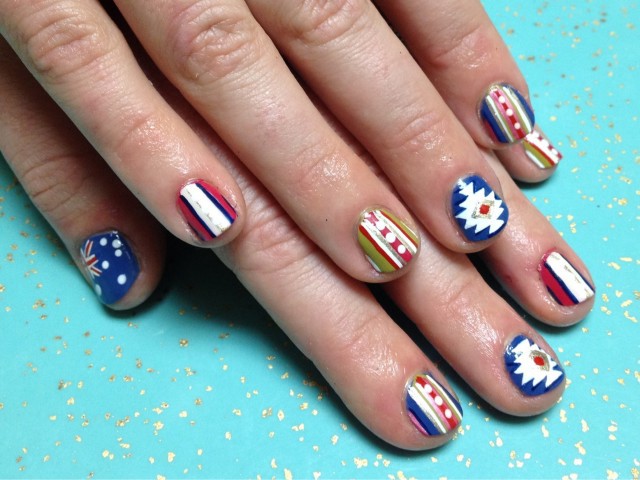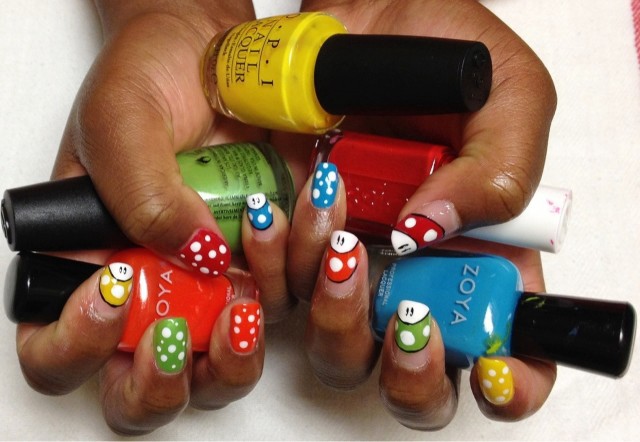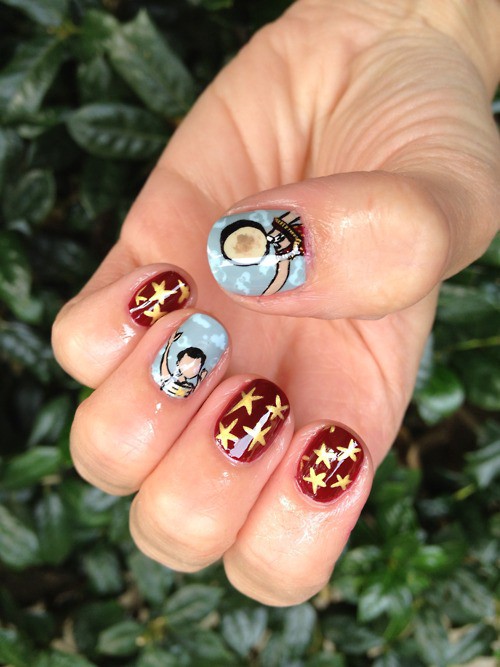How Meghann Rosales Started Nails Y’all, Her Nail Art Business
by Sarah McAbee

I value few things more than my sense of financial security. Because of my risk-averse, pro-regular-paycheck nature, I’ve always marveled at people who have the courage to go out on their own and start a business or work as a freelancer.
When I moved to Austin a few years ago, I noticed that many of the businesses I frequent are run by people around my age: in their late 20s and early 30s. I began to wonder if my friends who own businesses have something that I don’t. Do they have a different relationship to money, or to work? How did they recognize an entrepreneurial spirit in themselves, and then act on it once they did? I interviewed one of them in the hopes that I could understand just how tough someone had to be to start a business — in this economy — before turning 30.
Meghann Rosales’s one-woman nail art business, Nails Y’all, opened in 2011. She first made her name doing pop-up manicure tables at Austin ladies’ nights, and opened her own studio in late 2012.
When did you first start doing nail art?
I guess it was probably a couple of years ago. A friend of mine and I would go over to each other’s houses and do each other’s nails and just hang out. We have pretty similar style and design taste, so we started emailing nail designs back and forth, and practicing on each other, and we’d go to Sally and we’d, like, split a bottle of acetone. The very first thing we did was a cool reverse French — we were really into a mint reverse French. So just playing around like that, I realized, “Oh! I can do these. I’m kinda good at this.” But there are all these intricate designs I didn’t know how to do, and there was no one in Austin I could find that would do natural nails with the designs that I was into. I decided I would start a business for nail art, and so I looked into how to do that legit. I realized I needed my license, so I went to beauty school. That was just kinda the path that it took. I was just playing around on the porch with my friend.
Have you always really liked nail polish?
No, not really. I don’t think any more than the average girl likes nail polish. But there was something about realizing I could make beautiful things and it was really, really fun. A lot of it was self-taught, before I went to beauty school — and even during beauty school — it’s been fun to learn and play around, and figure it all out.
Between when you first had this idea and when you went to beauty school, how long was that?
Between when I started playing around with nails and went to beauty school, that was two or three months. When I decided to open the business, I called that week to get a tour of the school, because I figured, why wait?
After coming out of beauty school, when did you start Nails Y’all?
Immediately. I think it might have even been before beauty school. I started doing events. When I went to beauty school, I found a six-month nail program because I knew what I wanted, and it was to open a shop. I didn’t mess around with anything else. And because I knew I wanted to open a shop, I started looking online, and realizing this is how a lot of nail artists spread their work, and this is what I need to do — I started doing events and parties and marketing myself just through word of mouth while I was still in school.
Where were you professionally at that time? What had you done up until that point and what were you doing then?
I was at Thunderbird, and I still am. Before that, I’d been living in New York as a teacher, and I got my master’s in education. But moving back to Austin, I’d gotten back into what I’d done before New York, which was community education and nonprofits and all of that, which is hard to find a job in. Especially when I got here, teaching was basically out of the question. I got here shortly before AISD laid off 1,000 teachers. And I was working really hard and hoping to go full-time with several different gigs. At one point I think I had five different jobs — it was ridiculous — and was still working at the coffee shop. And it was just terrible. I realized I wasn’t gonna get a teaching job, and at that point I didn’t really care. I guess I’d stopped looking. You can really only hear “no” for so long as a qualified person that can’t get a job in their field. So I just decided, why not work for myself and be creative?

How much of that was that personal decision, and did it factor in at all that you couldn’t find someone who was doing this in Austin? That kind of — “Oh! I see a hole in the market.”
That definitely fueled it because there was a need. I don’t know much about business and I knew even less then, but I knew one of the principles was you don’t want to get into an over-saturated market. And I did my research. I knew there was a particular kind of girl who was looking for a particular kind of thing, and maybe didn’t even know it yet, and that I could do that. And I was just so frustrated with working 3, 4, 5 jobs at a time. It was exhausting. I didn’t like it. So at that point it just felt like well, I literally have nothing to lose.
Up to that point, had you ever even idly considered —
No. Never.
Has anyone in your family ever run their own business?
No, but I got really lucky. My dad works for HP, and his background is in economics, and I knew in that sense I had that covered. I could ask him questions about finances and all of that, which I do. But I think what happened was, I came to Austin, I got to know more people and I made a ton of friends who were just doing the coolest things — running their businesses, opening shops, doing stuff — and I thought it was just so inspiring to hear what they were doing. Like, you guys are my age, we have similar backgrounds, and this is something you do and you’re struggling, or you’re not struggling, and it’s inspiring. I remember before I went to beauty school — I’d made the decision but I hadn’t told anybody, really — I went to a Willie Nelson concert with a bunch of my co-workers from Thunderbird. There were six of us, I think. And that night, we were all talking about the businesses we were gonna start. All six of us. Or the goals we had. I think five of us were gonna start businesses. And none of us had any background in it, none of us had any idea how to do it, but we were all like, “Yeah, let’s just do this.” And that was so inspiring. And everybody’s done it from that group.
That’s amazing! Why do you think that is? Is it the place we live, or the kind of people they are, or is it something bigger —
I think it has to be a combination of all of that. I think in Austin, you have the opportunity to wear so many hats. Everyone who’s serving you food or coffee is doing something pretty cool outside of that capacity. And I think that’s why people — I don’t know, maybe I can only speak personally and for my friends who feel the same — but you take these shitty jobs because you have the time to pursue all these other things. And maybe it was the economic shift. Maybe it was just being in your late 20s and like, “Shit. I have nothing, and this economy is going to provide me with nothing.” Maybe you just start feeling more that you need to rely on yourself.
That sense that it used to be enough to have a steady job, and now it’s become so much clearer that that’s really an illusion of stability.
You know, we’re college-educated —
I mean, you have an advanced degree.
Right. Two of us did in that group. And we were told, you do all that, you’re set for life. And that’s not true. I think the generation before us is starting to get that now in a way they didn’t until recently.
That it’s not enough to be like, “You slacker millennials who are just moving home!” No, I’m moving home because I’ve had five internships and I still can’t get a job.
And I have incredible, staggering amounts of student loans, because this is the path I was supposed to choose and now it’s not paying off. When facing that, opening your own business is kind of like, “Eh. I don’t have any money anyway.”

How much does it cost to go to beauty school, to do that six-month program?
About $3,300, somewhere around there. Most people who go get financial aid, and I went with some girls who didn’t pay anything. I couldn’t get any financial aid because the government had given me enough, they said. So I paid out of pocket.
Did you have it in savings?
I took out a loan from my boyfriend. I borrowed $3,000 so I could just pay immediately.
I’m imagining that you still had student loans.
Oh, I HAVE. I have lots. Well, actually not lots. Other people, comparatively, have lots. I have student loans, yes. At that time, probably about $7,000. It’s not a lot of money…
It’s significant, though!
It is significant when you’re making $12,000 a year. There’s been a lot of time in my life when making a $78 monthly payment was no big deal, but the last few years have not been those times. I’ve definitely learned to live differently. But by my standards, I still live well. I think if you can find the right balance in your lifestyle and your finances, then you’re in an OK place to make the decision that I’m going to do this big, scary thing.
Can you talk a little about what that balance meant for you? Were you able to build enough time into your regular Thunderbird schedule that you could make a little extra, or how did that…?
I still have a very hard time quitting that job, because of paralyzing fear. I grew up very comfortably, and there’s this fear of living paycheck-to-paycheck — it’s the most terrifying feeling to me. That’s what keeps me doing so much work, and probably forever will keep me doing so much work — that fear of not having money. Thunderbird was very flexible in scheduling so that I could go to school, and is still very very flexible so that I can run the business.
How many hours were you going to school?
I was going to school four days a week, for eight hours a day. I would leave beauty school at 4:45 to get to Thunderbird by 5, work until midnight and then get up and do it again. And then every weekend I’d work at Thunderbird, too. So I would work there probably 4 to 5 shifts a week. And I still work 4 to 5 shifts a week. It’s a lot.
And with the transition out of school, out of just events and into regular shop hours, was that because you felt like you’d had the income squared away with Thunderbird?
When I did the math, it was a low enough risk, and in general nail salons have a very low overhead. That was part of why I was like, “I can do this.” I rarely have to pick up product. My biggest expense is rent. When I started the business, before I signed my lease, I did all the math and figured out I would lose, worst case scenario, $5,500 if I signed a six-month lease and if it just bombed. At the time, I had enough set away in my savings that $5,500 could come out of my savings, or I could write someone a check for that, in theory. Initially everything came out of my personal savings, because I wasn’t making enough profit to pull it out of my business account. I think the first month’s rent came out of my savings. Unfortunately the same kind of fear that drives me to save personally is also reflected in my business finances. I couldn’t feel like I’d been making enough to justify pulling out my Nails Y’all credit card to pay for new bottles of shellac, so I was pulling that out of my savings, too. I corrected that about halfway through. But I learned a lot from that.
It’s amazing that you even had significant savings.
I save everything, and I think that’s just part of being so terrified of living paycheck to paycheck. If my savings account drops below $1,000 — it used to be below $5,000 and over the years my acceptance of what is security has definitely been redefined — it just terrifies me. But I knew at the time that I could get away with it financially, so I went for it. Since then I’ve drained my savings doing that, because you’ve gotta live. It’s being rebuilt. I’m back up to my security level, so I’m fine, but it’s interesting for sure. My savings have always been for medical bills, the what-ifs, the car repairs, and to actually use it to survive was very stressful and continues to be a very stressful thing. I don’t like it.
How have your saving habits changed?
I don’t think they have. It’s just smaller numbers. All of my paychecks go directly to savings, because I deal in cash so much at Thunderbird. What I try to do is deposit my cash as well, but I always try to have a little bit on me. Just to meet basic needs. Otherwise everything is saved. I’m 30 — I’d like to have a house and a family someday.
Everyone I know who’s really serious and consistent about saving, it’s because of that sense of fear.
I think it’s kinda interesting because I associate this crazy Depression-era tendency with someone who might have grown up in poverty, or who might have grown up less fortunate than I did, but we were fortunate enough that my parents didn’t teach me a whole lot about money because we didn’t have to discuss it. Well, that’s not true, but they chose not to discuss it with us. I guess this is a learned behavior. My dad grew up very, very poor, and I know part of the reason it was never discussed with us, and never a stress in our childhoods, is that it was something he deliberately did.
That was something he could provide for you.
Right. So different than his experience. And I think the down side of that is though I became an adult, got the good job, lost the good job, my life changed a lot, and I learned those skills. I picked them up, but it wasn’t in my background. I think if I had kids I’d definitely talk to them about money. I’d make money a relevant conversation.
How do you think about your business in the context of what the economic reality is now? You mentioned the last time I saw you, someone was asking you, “Do you think it’s too stupid to have a specialty grilled cheese business?” and you were like, “My business is nail art!”
I know what I’m doing. I know what this business is. And I have a sense of humor about it, I think.
Your type of business can also be hard to understand, because it’s so new.
It is.
Because it is art, and because it is, in some ways, a service, and because it looks like something else that people are familiar with, but it’s very qualitatively different.
I’ve definitely had an evolving title for myself. Even when I did my taxes this year, my dad was helping me, and said “What’s your occupation? What do you want to be called?” I kind of stumbled, and he said “nail artist.” And I said yeah, that’s absolutely true. “Manicurist” is fun because it had this great connotation of that scene in that old movie The Women, where they’re gossiping, so I really like that Doris Day kind of feel — but that wasn’t true to what I’m doing, and I felt like “nail artist,” yeah, that’s correct. “Nail tech,” that’s very common, but that’s not what I do. It is funny because of its prevalence now, because of nail art being everywhere. Now when I tell girls and women what I do, they’re like, “Oh yeah!” But men are like “Whaaa?” It’s hard to explain it.
Is there any advice you would give to someone like you, just starting their first business?
I would encourage them to do it, first of all. And I would also encourage them to do their research. If you’re going to have enough belief in yourself that what you have to market is going to be well-received, then plan your prices accordingly. Plan where you’re going to be accordingly. Plan for all of that. Assume that as good as an idea you think this is, people will think it’s better. Have confidence in that. And then make sure that you’re financially OK, because OH MY GOD. You’re going to be stressed out about money no matter what, and you don’t want to add extra stresses. Also, find a really good network. I’ve been so fortunate to have so many people who are good at so many things, and own their own businesses, or could provide consultation. Having people to bounce ideas off of is so important — having people who will give you really honest feedback, not someone who will just encourage you to do terrible things because they want you to “live your dream.”
What would Nails Y’all need to be for that to be your full-time gig? And would you want it to be?
Yeah. Definitely.
Is it getting to a savings threshold, a financial threshold, demand?
I need to be making more, because I’m not happy with the lifestyle that just working at Thunderbird affords me. It needs to be take-home money, without the overhead, without having to pay out all my other bills. I don’t know what that number is, but it’s gotta be more than what I’m taking home now. But it’s this huge catch-22 because I can’t leave Thunderbird for financial reasons, so I can’t open myself up to more appointments. I can’t go full-time. There’s just no way to make that happen. But because I did choose to end my lease, there was a terrifying period after I’d made the decision, where I was like “I don’t know what I’m going to do. I have no idea what’s coming next. Should I quit? Should I try to use my degree that I spent all of this money on?” But I’ve been talking with this salon about removing that overhead that I have and going in as an employee. So that brings a whole new set of challenges — personal issues about not running my own business. But oh my god — I’d go in four days a week and I’m done. Someone hands me a schedule and that’s it, which is pretty awesome. So that would be the scenario where I could quit.
It sounds like it has a lot of promise. It’s interesting to talk to you now because it seems like it’s such a big point of possible transition for you.
Well, at the beginning, it felt like defeat. But it doesn’t now. Now it’s like, “Oh! Things evolve.” I’ll still be able to maintain my identity as Nails Y’all through the events, and I want to start doing more pop-ups, travel with it, so in that way I can still do creatively what I want, but I’m supported in a way where I can also have dinner with my boyfriend sometimes. Although I gotta say, when I was deciding not to renew my lease and there was a very very stressful feeling of failure, Marketplace was running a bunch of stories about people’s failed businesses, and what it means to follow your dreams. There’s this idea that when your dreams don’t turn out the way you’d planned, you have failed to pursue your dreams, then what’s left? It was very comforting to hear about people’s failures and to think, like, “oh, they lost their house.” My life’s OK.

I understand that. Like, you shouldn’t have to identify with your work, but you should actually live your dream and reach all your goals and do what you want. Which is it? And there are other questions, like is your dream a realistic dream? Have you taken steps to get moving on that path? Do you know what it’s going to take?
And in my case, my dream wasn’t to provide the world with beautiful nail art. My dream was to be a working artist. And this is the way that I can do it, and I can hang out with women, and I can be creative, and I can listen to Beyoncé all day. That, to me, is the definition of living my dream, and I’ve been so fortunate in that I’ve gotten to do it. I told you how short it was between when I said I was going to start this business and when I went to take a tour of beauty school, and I think in that way, my impulsivity — that was when it worked well for me. And I just didn’t stop to think because I felt “this’ll work.” And because I didn’t have another option. There was nothing else. So I didn’t give it a ton of thought. Maybe I was not cautious enough, because I didn’t think “Maybe I shouldn’t do this…” There just never was that moment.
It seems like on the one hand, it was a short-term goal, like “I like to do this; I can do this,” but it seems like it’s really less impulsive because it’s the culmination of that long-term goal, “I want to be a working artist.”
Yeah, and it’s a culmination of like, I’ve been drawing quietly in my room since I was a kid, and I’ve been working on these impossibly fine lines since I was so little, and putting together things and having my work viewed, and working on sketches and going to drawing sessions and all of that, and it was always just for fun. It was just a dream, like “Maybe I’ll be a working cartoonist someday,” but this was so unexpected. I’m using all of that now. In that way, I am living my dream. I get to be a cartoonist with tiny canvases.
And more colors!
And way more colors.
Meghann Rosales is an Austin-based nail artist and cartoonist. Her one-woman operation, Nails Y’all, specializes in unique natural nail designs. Sarah McAbee is a writer and nail art aficionado.
Support The Billfold
The Billfold continues to exist thanks to support from our readers. Help us continue to do our work by making a monthly pledge on Patreon or a one-time-only contribution through PayPal.
Comments